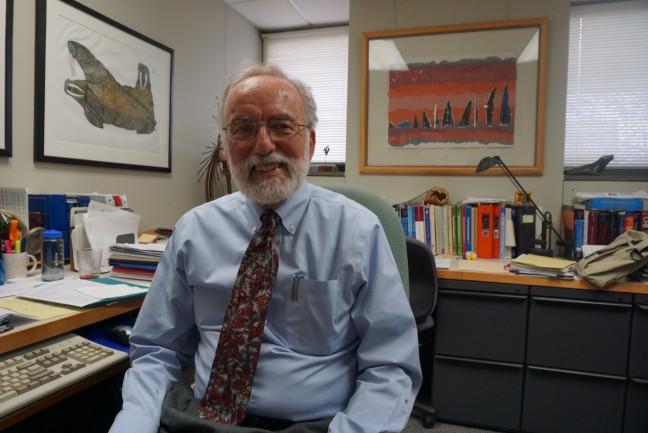If you see a balloon explode into green flames with a loud bang in a classroom packed with 300 people, you’ve come to the lecture of John Moore, a University of Wisconsin chemistry professor and one of 12 recipients of UW’s 2016 Distinguished Teaching Awards.
The Distinguished Teaching Awards, started in1953, recognize the best educators in the university based on their contributions in different academic fields, according to a UW statement. Moore was awarded based on his chemical outreach education that goes above and beyond the scope of the university, extending to a much broader learning community.
Though he teaches freshman and sophomore level courses at UW, Moore has dedicated most of his energy to bringing chemistry to children and inspiring young people to pursue science. For 25 years, he has organized multiple week-long summer camps for children to come into UW’s chemistry labs and learn hands-on knowledge about the world of chemistry.
“Our main goal is we want to attract them into science; we want them to think about becoming scientists,” Moore said.
The summer camps have themes like “fun with chemistry,” “fun with chemical engineering” and “fun with forensic science,” that can give children an early look into the subjects that seems complicated, but are fundamentally relevant to everyday life, he said.
Moore hires undergraduate students to interact with the kids and do chemical experiments during the camps, witch each student usually being in charge of three children, he said. He himself acts as the overall supervisor to make sure programs run smoothly and have secure funding.
Moore also directs some after-school programs with the Boys and Girls Club of Dane County, in hopes of encouraging young minorities to go into science.
“Some of these programs, the goal is really to help increase diversity in sciences,” Moore said. “The Boys and Girls Club particularly, because a lot of the children that attend there are from groups that are traditionally not well-represented in sciences.”
Since he came to UW in 1989, Moore has served as the director for the Institute for Chemical Education, a national center for science education within UW. The center’s mission aligns with Moore’s ideals — to help kids develop interests in science.
One of the big projects ICE does over the years, Moore said, is distribute chemical kits to children all over the world. One example is a solid state modeling kit, which includes balls and sticks to simulate three-dimensional models of many crystal structures, Moore added. He has also introduced a solar cell kit to help kids build their own solar panels.
The model kits are expensive and no other organization wants to sell them, Moore said, so ICE took on the task of selling them at the lowest price possible, and make them available to children around the world.
“A lot of these are really useful kits, but there’s nobody who thinks they can actually survive by doing it,” Moore said. “We don’t have to make a profit, we just break even, so that helps.”
Moore is a strong advocate in active learning in the classroom. He put together a series of online learning materials and tools to facilitate chemical education, such as multimedia demonstrations for chemical reactions that every student who has taken general chemistry with him is familiar with.
He also organizes his class discussions into different tables so students on each table can interact closely with the chemicals they are learning about, while he and the TAs will circle the room, ready to answer questions.
“I’d really like to make sure that people get involved, hands-on and interacting with the chemistry and chemistry ideas,” Moore said.
Moore said he always wanted to pursue a career in the sciences and almost went into physics. But when he was an undergraduate at Franklin and Marshall College, he took a chemistry class and immediately fell in love.
From then on, he has worked to not only educate himself about chemistry, but more importantly, share the wisdom with tens of thousands of students who aspire to be scientists as well.
“I was always interested in education, and when I was an undergraduate people pointed out that you could get a Ph.D. and go to a college or university to teach,” Moore said. “That sounded pretty good, so I did that, and I’ve been doing that for a long time since.”


